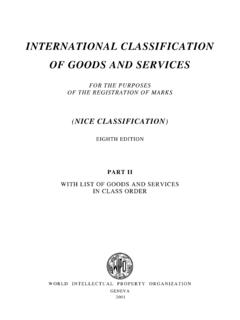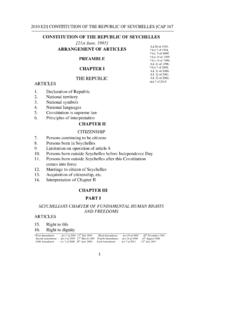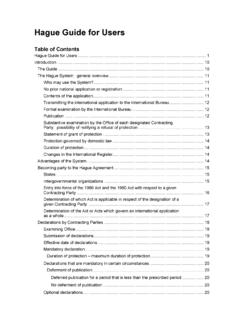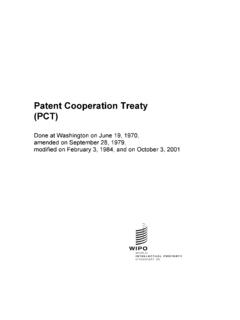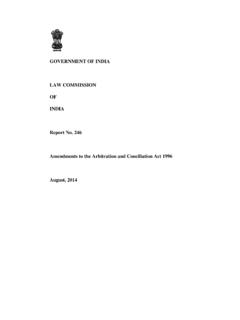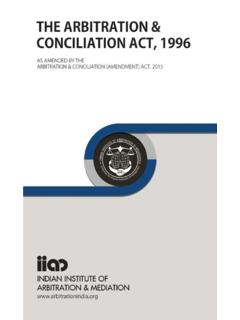Transcription of The Arbitration and Conciliation Act, 1996 - wipo.int
1 THE Arbitration AND Conciliation . ACT, 1996. CONTENTS. PRELIMINARY. 1. Short title, extent and commencement PART-I. Arbitration . CHAPTER I. GENERAL PROVISIONS. 2. Definitions 3. Receipt of written communications 4. Waiver of right to object 5. Extent of judicial intervention 6. Administrative assistance CHAPTER II. Arbitration AGREEMENT. 7. Arbitration agreement 8. Power to refer parties to Arbitration where there is an Arbitration agreement 9. Interim measures by court CHAPTER III. COMPOSITION OF ARBITRAL TRIBUNAL. 10. 10. Number of arbitrators 11. Appointment of arbitrators 12. Grounds for challenge 13. Challenge procedure 14. Failure or impossibility to act 15.
2 Termination of mandate and substitution of arbitrator CHAPTER IV. JURISDICTION OF ARBITRAL TRIBUNALS. 16. Competence of arbitral tribunal to rule on its jurisdiction 17. Interim measures ordered by arbitral tribunal CHAPTER V. CONDUCT OF ARBITRAL PROCEEDINGS. 18. Equal treatment of parties 19. Determination of rules of procedure 20. Place of Arbitration 21. Commencement of arbitral proceedings 22. Language 23. Statements of claim and defence 24. Hearings and written proceedings 25. Default of a party 26. Expert appointment by arbitral tribunal 27. Court assistance in taking evidence CHAPTER VI. MAKING OF ARBITRAL AWARD AND TERMINATION OF. PROCEEDINGS.
3 28. Rules applicable to substance of dispute 29. Decision making by panel of arbitrators 30. Settlement 31. Form and contents of arbitral award 32. Termination of proceedings 33. Correction and interpretation of award; additional award CHAPTER VII. RECOURSE AGAINST ARBITRAL AWARD. 34. Application for setting aside arbitral award CHAPTER VIII. FINALITY AND ENFORCEMENT OF ARBITRAT AWARDS. 35. Finality of arbitral awards. 36. Enforcement CHAPTER IX. APPEALS. 37. Appealable orders CHAPTER X. MISCELLANEOUS. 38. Deposits 39. Lien on arbitral award and deposits as to costs 40. Arbitration agreement not to be discharged by death of party thereto 41. Provisions in case of insolvency 42.
4 Jurisdiction 43. Limitations PART II. ENFORCEMENT OF CERTAIN FOREIGN AWARDS. CHAPTER I. NEW YORK CONVENTION AWARDS. 44. Definition 45. Power of judicial authority to refer parties to Arbitration 46. When foreign award binding 47. Evidence 48. Conditions for enforcement of foreign awards 49. Enforcement of foreign awards 50. Appealable orders 51. Saving 52. Chapter 11 not to apply CHAPTER II. GENEVA CONVENTION AWARDS. 53. Interpretation 54. Power of judicial authority to refer parties to Arbitration 55. Foreign awards when binding 56. Evidence 57. Conditions for enforcement of foreign awards 58. Enforcement of foreign awards 59. Appealable orders 60.
5 Saving PART III. Conciliation . 61. Application and scope 62. Commencement of Conciliation proceedings 63. Number of conciliators 64. Appointment of conciliators 65. Submission of statements to conciliator 66. Conciliator not bound by certain enactments 67. Role of conciliator 68. Administrative assistance 69. Communication between conciliator and parties 70. Disclosure of information 71. Co-operation of parties with conciliator 72. Suggestions by parties for settlement of dispute 73. Settlement agreement 74. Status and effect of settlement agreement 75. Confidentiality 76. Termination of Conciliation proceedings 77. Resort to arbitral or judicial proceedings 78.
6 Costs 79. Deposits 80. Role of conciliator in other proceedings 81. Admissibility of evidence in other proceedings PART-IV. SUPPLEMENTARY PROVISIONS. 82. Power of High Court to make rules 83. Removal of difficulties 84. Power to make rules 85. Repeal and saving 86. Repeal and saving THE FIRST SCHEDULE. THE SECOND SCHEDULE. THE THIRD SCHEDULE. THE Arbitration AND Conciliation . ACT, 1996. (No. 26 of 1996). [16th August 1996]. An Act to consolidate and amend the law relating to domestic Arbitration , international commercial Arbitration and enforcement of foreign arbitral awards as also to define the law relating to Conciliation and for matters connected therewith or incidental thereto.
7 PREAMBLE. WHERE AS the United Nations Commission on International Trade Law (UNCITRAL) has adopted the UNCITRAL Model Law on International Commercial Arbitration in 1985;. AND WHEREAS the General Assembly of the United Nations has recommended that all countries give due consideration to the said Model Law, in view of the desirability of uniformity of the law of arbitral procedures and the specific needs of international Commercial Arbitration practice;. AND WHEREAS the UNCITRAL has adopted the UNCITRAL Conciliation Rules in 1980;. AND WHEREAS the General Assembly of the United Nations has recommended the use of the said Rules in cases where a dispute arises in the context of international commercial relations and the parties seek an amicable settlement of that dispute by recourse to Conciliation .
8 AND WHEREAS the said Model Law and Rules make significant contribution to the establishment of a unified legal framework for the fair and efficient settlement of disputes arising in international commercial relations;. AND WHEREAS it is expedient to make law respecting Arbitration and Conciliation , taking into account the aforesaid Model Law and Rules;. BE it enacted by Parliament in the forty-seventh year of the Republic as follows: - PRELIMINARY. 1. Short title, extent and-commencement.. (1) This Act maybe called the Arbitration and Conciliation Act, 1996. (2) It extends to the whole of India: Provided that Parts I, III and IV shall extend to the State of Jammu and Kashmir only in so far as they relate to international commercial Arbitration or, as the case may be, international commercial Conciliation .
9 Explanation. -In this sub-section, the expression international commercial Conciliation shall have the same meaning as the expression international commercial Arbitration in clause (f) of sub-section (1) of section 2, subject to the modification that for the word Arbitration . occurring therein, the word Conciliation shall be substituted. (3) It shall come be deemed come into force on the 25th day of January 1996. PART I. Arbitration . CHAPTER I. GENERAL PROVISIONS. 2. Definitions. - (1) In this Part, unless the context otherwise requires, - (a) Arbitration means any Arbitration whether or not administered by permanent arbitral institution;. (b) Arbitration agreement means an agreement referred to in section 7.
10 (c) Arbitral award includes an interim award;. (d) Arbitral tribunal means a sole arbitrator or a panel of arbitrators;. (e) Court means the principal Civil Court of original jurisdiction in a district, and includes the High Court in exercise of its ordinary original civil jurisdiction, having, jurisdiction to decide the questions forming the subject-matter of the Arbitration if the same had been the subject-matter of a suit, but does not include any civil court of a grade inferior to such principal Civil Court, or any Court of Small Causes;. (f) International commercial Arbitration means an Arbitration relating to disputes arising out of legal relationships, whether contractual or not, considered as commercial under the law in force in India and where at least one of the parties is- (i) An individual who is a national of, or habitually resident in, any country other than India; or (ii) A body corporate which is in corporate in any on n try other than India; or (iii) A company or an association or a body of individuals whose central management and control is exercised in any country other than India; or (iv).


